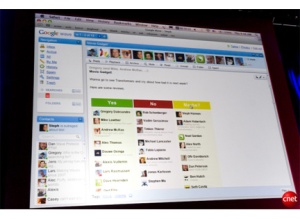Google kills off Wave, Gears and Knol in project cull

Google plans to scrap Wave, Gears, Knol and Bookmarks Lists in coming months, adding to the list of failed products the company has shut down.

Google has killed off Wave, Gears and Knol in another wave of project cuts. Photo credit: CNET News
The closure announcement, the third in as many months, came in an official Google blog post on Tuesday. Operations chief Urs Hölzle said the doomed services had failed to make sufficient impact and were either being shut down or folded into more successful products.
Google Wave, once the next big thing for the search giant, is scheduled to go in April. A combination of email, instant messaging, file-sharing and collaboration tools, Wave saw active development cut off in August 2010, little more than a year after the service was unveiled.
"As of January 31, 2012, Wave will become read-only and you won't be able to create new [waves]," Hölzle said in the blog post. "On April 30, we will turn it off completely. You'll be able to continue exporting individual waves using the existing PDF export feature until the Google Wave service is turned off."
Hölzle noted that there are a couple of open-source Wave projects, such as Apache Wave and Walkaround, being run separately from its own service.
Gears halted
Google Gears is also for the chop, as the company indicated earlier this year when it killed off the Gears browser extension. The plug-in was introduced in 2007 as a way of getting web apps to run offline, but this functionality can now be accomplished through HTML5 and other means.
On 1 December, Gears-based Gmail and Calendar offline will stop working in all browsers, Hölzle said, adding that Gears will be made unavailable for download later that month.
"This is part of our effort to help incorporate offline capabilities into HTML5, and we've made a lot of progress," he said. "For example, you can access Gmail, Calendar and Docs offline in Chrome."
Google hitlist
Google Knol is also on the hitlist. Introduced in 2007 as the company's answer to Wikipedia, it was one of many Google services that failed to gain the attention of the public at large. Hölzle noted that Google has been working with Solvitor and Crowd Favorite to develop a Wordpress-based, open-source "scholarly authoring and publishing platform" called Annotum.
Users will be able to download 'knols' — Google's word for 'articles' — and migrate them to Wordpress.com. Knol will stop working normally on 30 April. From 1 May to 1 October, knols will be exportable but not viewable. After 1 October, the whole service will disappear.
Google Bookmarks Lists, an English-only experimental feature for sharing bookmarks, will die on 19 December this year. According to Hölzle, "all bookmarks within Lists will be retained and labelled for easier identification".
Friend Connect, which can be used to add social features to sites, will be retired for all non-Blogger sites on 1 March. As with Reader, Google is trying to steer people towards using Google+ for such things.
"We encourage affected sites to create a Google+ page and place a Google+ badge on their site so they can bring their community of followers to Google+ and use new features like Circles and Hangouts to keep in touch," Hölzle wrote.
People who use Google Search Timeline to see historical results for a query will also see the service disappear, although Hölzle did not give a specific date for this.
RE<C closure
The final item on the list was Renewable Energy Cheaper than Coal (RE<C), Google's drive to fund research into low-cost renewable energy sources.
"At this point, other institutions are better positioned than Google to take this research to the next level," Hölzle wrote. "So we've published our results to help others in the field continue to advance the state of power tower technology, and we've closed our efforts. We will continue our work to generate cleaner, more efficient energy — including our on-campus efforts, procuring renewable energy for our datacentres, making our datacentres even more efficient and investing more than $850 million in renewable energy technologies."
The announcements are the third wave of closures, the first having taken place in September and the second in October.
The paring-down of Google's product portfolio is a result of chief executive Larry Page's desire to get "more wood behind fewer arrows", a strategy that began with the scrapping of Google Labs, announced in July.
Get the latest technology news and analysis, blogs and reviews delivered directly to your inbox with ZDNet UK's newsletters.